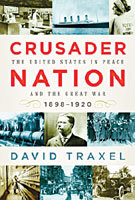home | metro silicon valley index | the arts | books | review

Crusader Nation: The United States in Peace and the Great War, 1898-1920
REVIEW (By David Traxel; Knopf; 413 pages; $27.50 cloth)
—Michael S. Gant
While we're waiting for the Democrats to come up with a new vision for society that isn't totally based on corporate suzerainty, it is a relief to read about the ideals of the Progressive Era. In the early 1900s, reformers, radicals and even some politicians worked to "to tame social and economic chaos and restore a sense of justice to the system," as historian (and UC-Santa Cruz grad) David Traxel writes. In his very readable, if not especially analytical, narrative, Traxel picks up the paths of some important players of the period, including writer John Reed on the track of revolution in Mexico and Russia, and crackpot industrialist Henry Ford and his comical peace mission to Europe. But despite its subtitle, the bulk of the book is devoted to the presidency of Woodrow Wilson and America's part in World War I. His chapters on German spying and propaganda in the United States on the eve of the war are especially novelistic with vivid characters such as the German ambassador Count von Bernstorff, who "shocked President Taft's sense of sartorial propriety by playing golf in a pink shirt and red suspenders." Traxel also restores the reputation of President Wilson, making him more human than the stiff-necked and dour aura that obscures his considerable intellect and diplomatic skills. It is the great tragedy of Crusader Nation that just when Wilson's credibility as a statesman was needed most—as the Great War ended, the Allies were calling for unrepairable retribution against Germany and America itself was growing weary of causes—he fell ill and died. The League of Nations failed in the U.S. Senate, and America entered a decade of good old-fashioned capitalist excess.
Send a letter to the editor about this story.
|
|
|
|
|
|